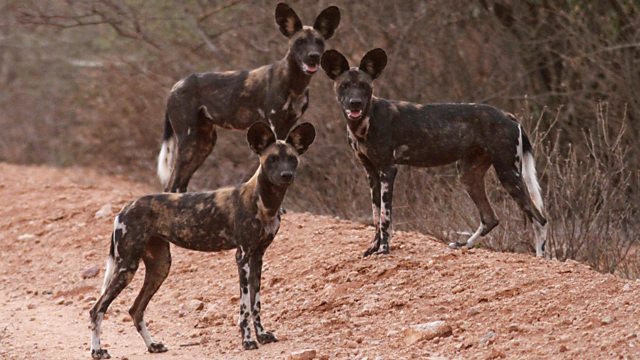The power of peace
Lucy Cooke explores cooperation, democracy and peaceful behaviour in animals and investigates whether these can be better evolutionary strategies than fighting and aggression.
“Nature red in tooth and claw”. “Dog eat dog”. “Fighting for survival". You may well think that the natural world is one dangerous, violent, lawless place, with every creature out for itself. And it can be, but it can also be peaceful, democratic and compassionate.
Lucy Cooke seeks out the animal communities that adopt a more peaceful and democratic way of life and asks why it works for them. Despite being fierce predators, African wild dogs are cooperative and compassionate within their packs, and they actually hold democratic votes on hunting decisions – one sneeze for yes, two sneezes for no! They are among the most effective predators in the world. They use extraordinary cooperation and teamwork to pursue, overhaul and bring down their prey. As a result 80% of their hunts end successfully, compared to lions' at 10%. This is nearly all a result of their pack coordination. They are also surprisingly non-aggressive; they don’t fight over food but instead beg to indicate their wish to eat. Adults will allow younger pack members to eat before them. And the African wild dogs are not alone: such societies are also common in insects, other mammals, and birds, but exist even in simple species like amoebas.
But what is the evolutionary advantage of this group cohesion? Why when nature selects for not just the individual but for the selfish gene, does it pay to be part of a complex social group? Lucy discovers that when the benefits of group-living outweigh the costs, it’s very much advantageous – when 10 pairs of eyes are better at spotting predators and pack strategies mean far more successful kills in a hunt, or when grooming not only strengthens bonds, but it also gets rid of your ticks and fleas. She also explores the different strategies of the highly complex social animals – the Great Apes – and asks whether Bonobos are truly the lovers and Chimpanzees the fighters?
This all touches on the complex social interactions we have as humans. We can be peaceful and we can be violent and war-like, and like every species, individual variation and circumstances can tip the balance of our behaviour. But anthropologist Agustin Fuentes questions the belief that humans are at their core violent, aggressive, and oversexed. Are these behaviours part of our genetic heritage? What can biology, evolution, and behaviour tell us about peace and aggression in everyday life?
Picture: African Hunting Dogs by Paul F Donald
Last on
More episodes
Previous
Broadcasts
- Mon 16 Sep 2019 19:32GMT���˿��� World Service except South Asia
- Tue 17 Sep 2019 04:32GMT���˿��� World Service Online, UK DAB/Freeview, News Internet & Europe and the Middle East only
- Tue 17 Sep 2019 05:32GMT���˿��� World Service Australasia, Americas and the Caribbean & South Asia only
- Tue 17 Sep 2019 06:32GMT���˿��� World Service East and Southern Africa & East Asia only
- Tue 17 Sep 2019 10:32GMT���˿��� World Service West and Central Africa
- Tue 17 Sep 2019 13:32GMT���˿��� World Service Australasia
- Tue 17 Sep 2019 17:32GMT���˿��� World Service South Asia
- Sun 22 Sep 2019 23:32GMT���˿��� World Service
Space
The eclipses, spacecraft and astronauts changing our view of the Universe
The Curious Cases of Rutherford and Fry
Podcast
-
![]()
Discovery
Explorations in the world of science.



